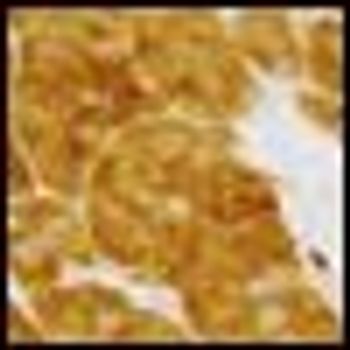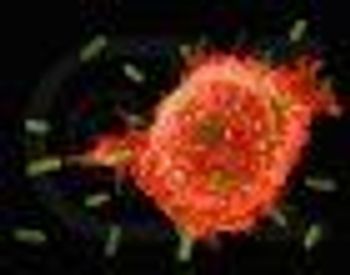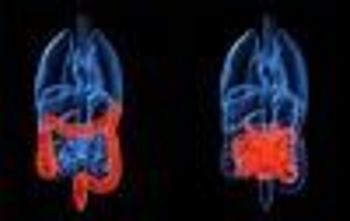
NCCN included a dinner symposium on Maintenance Therapy for Non-Small Cell Lung Cancer.

NCCN included a dinner symposium on Maintenance Therapy for Non-Small Cell Lung Cancer.

High-dose melphalan (Alkeran) and autologous stem cell transplantation are commonly incorporated into the initial line of therapy for patients newly diagnosed with multiple myeloma.

Despite recent therapeutic advances, lung cancer continues to be one of the leading causes of cancer-related mortality. Of the various histologic subtypes, non–small-cell lung cancer (NSCLC) is the most common-accounting for approximately 85% of all lung cancers-and will be the focus of this article. In general, the treatment of lung cancer may include surgery, radiation therapy, systemic therapy (eg, chemotherapy with or without targeted therapy), or a combination of the above. Surgery continues to offer the best chance of long-term cure. The initial treatment of stage I and II NSCLC usually entails surgical resection, whereas stage IV disease is primarily treated with systemic agents, in light of the lack of curative potential with surgery and/or radiation therapy alone. It is locally advanced NSCLC, including stage IIIA and IIIB disease, that continues to pose a therapeutic dilemma, given its heterogeneous nature.

Skin cancer is the single most common form of cancer, accounting for more than 75% of all cancer diagnoses. More than 1 million cases of squamous cell and basal cell carcinomas are diagnosed annually, with a lifetime risk of more than one in five. The vast majority of skin cancers can be cured with surgery alone. Resection is the mainstay of therapy, even for skin cancer involving regional lymph nodes or, in some cases, more distant metastatic sites.

The epigenetic control of gene expression has been shown to play an important role in cancer initiation, progression, and resistance. Thus, agents that modify the epigenetic environment of tumors will likely be an important addition to the anticancer arsenal. Specifically, there is much interest in modulating histone acetylation using a new class of drugs, histone deacetylase (HDAC) inhibitors. Preclinical data have demonstrated the efficacy of various HDAC inhibitors as anticancer agents, with the greatest effects shown when HDAC inhibitors are used in combination with other therapies. As a result of encouraging preclinical data, numerous HDAC inhibitors are being investigated in clinical trials either as monotherapies or in conjunction with other treatments such as chemotherapy, biologic therapy, or radiation therapy. In fact, vorinostat and depsipeptide, two actively studied HDAC inhibitors, were recently approved for the treatment of refractory cutaneous T-cell lymphoma. Although the use of HDAC inhibitors has generated great enthusiasm, a significant amount of work still needs to be done in order to understand their mechanisms of action, as well as to determine the appropriate patient characteristics and subsets of cancer for which HDAC inhibitors hold the most potential for effective treatment.

Shabason and colleagues’ review of the development of histone deacetylase (HDAC) inhibitors as treatment for cancers is timely, with an emphasis on therapeutic strategies combining HDAC inhibitors and radiation therapy. As the authors indicate, vorinostat (Zolinza)-originally known as suberoylanilide hydroxamic acid, or SAHA-was the first of the HDAC inhibitors approved by the US Food and Drug Administration (FDA) for clinical use in the treatment of cutaneous T-cell lymphoma (CTCL).[1] In November 2009, a second HDAC inhibitor-romidepsin (Istodax)-received FDA approval for the treatment of CTCL. Currently there is a great deal of competition in the HDAC inhibitor field, as several new and, hopefully, more effective compounds are being developed and entering clinical trials.[2]

he treatment of B-cell malignancies has been revolutionized by the availability of safe and effective monoclonal antibodies. The addition of rituximab to standard chemotherapy regimens prolongs the survival of patients with diffuse large B-cell lymphoma (DLBCL) and follicular non-Hodgkin lymphoma. Nevertheless, indolent and mantle cell lymphomas remain incurable, and 30% to 40% of patients with DLBCL still die from their disease. Much ongoing research has focused on optimizing monoclonal antibody use, integrating them into multiagent regimens, and developing newer antibodies. Attempts to improve on the efficacy of monoclonal antibody–based therapy have included altering the dosing schedule, optimizing patient selection, maintenance therapy, improving upon the rituximab molecule, radioimmunotherapy, as well as combinations with cytotoxic molecules and other novel agents. Preliminary data with a number of treatment regimens are promising in indolent and aggressive lymphomas. The eventual goal of targeted therapies is to individualize treatment to increase response and survival, while reducing treatment-related toxicity.

In this review, Ujjani and Cheson present a useful overview of the array of existing and developing roles for monoclonal antibodies in the management of B-cell non-Hodgkin lymphomas (NHLs). These roles may be characterized as single-agent antibody therapy, use in combination with chemotherapy and/or other antibodies, and use following an initial regimen (consolidation/maintenance). Rituximab (Rituxan), the first monoclonal antibody approved for B-cell NHL, clearly has had greatest application in each of these arenas, but it has now been joined by alemtuzumab (Campath) and ofatumumab (Arzerra) as approved single-agent therapies. Also highlighted are a number of other antibodies aimed at B-cell targets: veltuzumab, GA101, AME-133 (CD20), epratuzumab (CD22), lumiliximab (CD23), galiximab (CD80), dacetuzumab (CD40), mapatumumab, lexatumumab (TRAIL), and approaches to improve antibody therapy such as conjugation with radioisotopes or toxins.

CHICAGO-FDG-PET imaging of non-small-cell lung cancer patients prior to receiving radiation therapy should not be the basis for determining areas that may benefit from higher doses of radiation, according to research out of Philadelphia’s Thomas Jefferson University Hospital.

An FDA-convened panel of outside experts recommended 12 to 1 against approving approval erlotinib (Tarceva) as an early maintenance therapy for patients with non–small cell lung cancer (NSCLC).

The promise of pharmacogenetics is personalization of therapy for individuals through refinement of the risk/benefit profile of pharmaceuticals based on inherited gene mutations. Classic examples of the impact of pharmacogenetics in clinical practice include variants in dihydropyrimidine dehydrogenase and treatment with fluorouracil.

Bendamustine (Treanda) plus rituximab (Rituxan; B/R) was superior to CHOP plus rituximab (CHOP-R) as first-line therapy of indolent lymphoma and mantle cell lymphoma in a multicenter, randomized, controlled trial of the German Study Group on Indolent Lymphoma (StiL). At an oral presentation at the 51st ASH Annual Meeting, experts agreed that this study may be practice-changing.

Since the publication of a meta-analysis in 1995 that demonstrated a modest survival benefit compared to best supportive care, platinum-based chemotherapy became the cornerstone of therapy in the first-line setting in advanced-stage non–small-cell lung cancer (NSCLC) for patients with good performance status.[1] A recent meta-analysis of 16 randomized trials including 2,714 patients demonstrated an advantage of chemotherapy over best supportive care with an absolute improvement in survival of 9% at 12 months.[2]

Researchers are exploring ways to manipulate rituximab (Rituxan) when added to the current standard therapy for diffuse large B-cell lymphoma, specifically shortening the number of treatment days. Preliminary results of a phase III trial showed that rituximab plus CHOP over a 14-day cycle achieved similar response rates and comparable toxicity compared to CHOP on a 21-day cycle in newly diagnosed patients.

With the availability of newer drugs for treating multiple myeloma, such as proteosome inhibitors and immunomodulatory drugs (IMiDs), outcomes and depth of response are steadily improving. These developments have led to a debate about whether high-dose chemotherapy and autologous stem cell transplant should still be considered first-line therapy or whether newer drug regimens should replace transplant.

The treatment of early-stage non–small-cell lung cancer (NSCLC) has undergone a paradigm shift recently with the addition of systemic therapy to local therapy. The use of cisplatin-based chemotherapy following surgery is now a standard approach for patients with stage II–IIIA disease.

The US Food and Drug Administration has approved pemetrexed (Alimta), the first drug available for maintenance therapy of advanced or metastatic lung cancer. Pemetrexed disrupts metabolic processes that are dependent on the B-vitamin folate, a necessary ingredient for cell replication.

SAN FRANCISCO–Maintenance therapy with erlotinib (Tarceva) in patients with non-small-cell lung cancer following chemotherapy provided a statistically significant improvement in survival, according to results from the SATURN trial.

We have presented the first case of a patient with metastatic ATGCT with peritoneal carcinomatosis, who responded to treatment with a VEGFR tyrosine kinase inhibitor. Because of the relative paucity of such cases in the literature, no clear treatment strategy exists. For patients with metastatic ATGCT, enrollment in clinical trials testing novel therapies, including angiogenesis inhibitors, is a reasonable option.

AstraZeneca announced the company has submitted a New Drug Application to the FDA for an investigational drug, vandetanib ( Zactima) 100 mg, for use in combination with chemotherapy for the treatment of advanced non–small-cell lung cancer in patients previously treated with one prior anticancer therapy.

Dr. Ruan and colleagues provide an excellent summary of available treatment options, as well as new drugs on the horizon, for the management of relapsed mantle cell lymphoma (MCL). As the authors emphasize, treatment of relapsed MCL is strongly influenced by the patient’s first-line therapy and needs to be individualized based on both patient and disease characteristics.

Researchers are conducting an international phase III trial to examine the effect that a modified herpes virus has on melanoma tumors.

Researchers studying the molecular genetics of glaucoma are discovering new genes by applying high-powered technologies to their analysis of family pedigrees and looking for clues in animal models. These genetic discoveries are moving this field toward clinical applications.

An international, multi-institutional study presented at the 2009 Annual Meeting of the American Society of Clinical Oncology (ASCO), held May 29–June 2 in Orlando, Fla, found that use of pemetrexed (Alimta) as maintenance therapy following standard treatment improves overall survival for patients with advanced non–small-cell lung cancer (NSCLC); the study also further confirmed that this benefit is primarily limited to those with the nonsquamous subtype (abstract CRA8000).

A single-arm phase II study to evaluate treatment with EC145 in patients with chemotherapy-resistant non-small cell lung cancer who have failed multiple therapy regimens has turned in promising results, according to Endocyte.

Stem cell transplants may be a new, revolutionary way to treat Crohn's disease.

Genentech, Inc, announced that a phase III study (ATLAS) of erlotinib (Tarceva) in combination with bevacizumab (Avastin) as maintenance therapy following initial treatment with Avastin plus chemotherapy in advanced non–small-cell lung cancer (NSCLC) met its primary endpoint.

Epidermal growth factor receptor (EGFR) inhibitors have emerged as important drugs in cancer therapy, providing a proven survival advantage for some patients with non–small-cell lung cancer, colorectal cancer, head and neck cancer, and pancreas cancer.

STOCKHOLM-Final analysis of the phase III Avastin in Lung Study (AVAiL), which evaluated bevacizumab (Avastin) as first-line therapy for advanced nonsmall- cell lung cancer, showed that adding bevacizumab to gemcitabine/cisplatin significantly extends progression-free survival, Christian Manegold, MD, of Heidelberg University in Mannheim, Germany, reported at ESMO 2008 (abstract LBA1).

Cell Therapeutics, Inc, recently announced that the US Food and Drug Administration (FDA) has accepted for filing and review, and has granted priority review status for, the supplemental Biologics License Application (sBLA) for use of 90Y-ibritumomab tiuxetan (Zevalin) as consolidation therapy for patients with follicular B-cell non-Hodgkin lymphoma who achieve a response to first-line therapy.